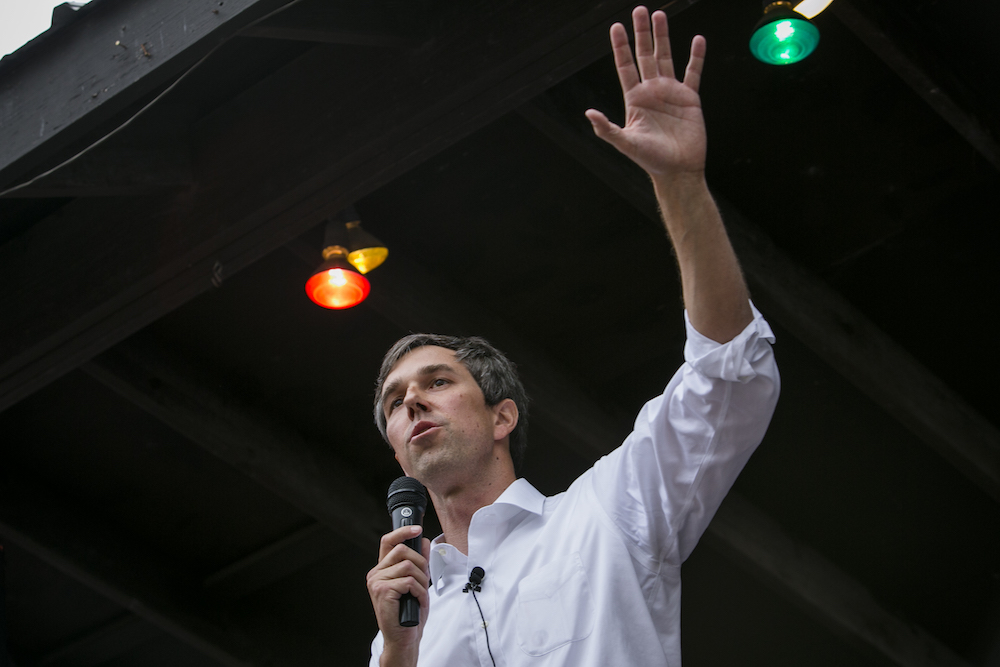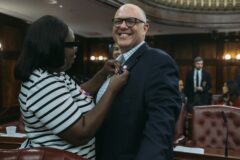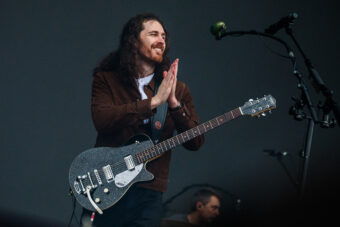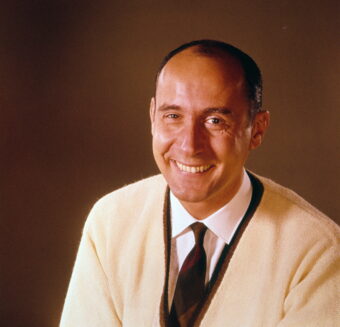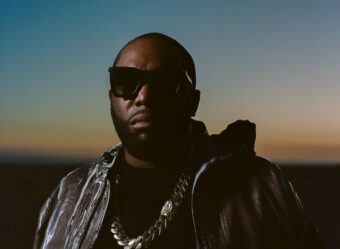Before he fronted At the Drive-In, and later the Mars Volta, Cedric Bixler-Zavala played drums in an all-but-forgotten forgotten Texas post-hardcore band called Foss. You won’t find their music on any streaming service, and you’d have a hard time finding their records anywhere but in the basements of the most obsessive punk collectors. The easiest way to hear them is via a couple of blown-out YouTube videos: a caterwauling performance in El Paso from 1993; an unlikely appearance on public-access TV, soundtracking a Christian talk show called Let’s Get Real. Foss would be little more than a footnote on Bixler-Zavala’s Wikipedia page if not for the case of its bassist: Democratic El Paso Congressman and U.S. Senate candidate Beto O’Rourke.
Twelve years after Foss released its debut seven-inch The El Paso Pussycats, O’Rourke became an El Paso city councilman. In 2012, he scored a surprise primary victory over eight-term Democratic incumbent Silvestre Reyes in the race to represent Texas’s 16th congressional district, running on a platform that included support for marijuana legalization and LGBT and abortion rights. He went on to defeat his Republican challenger in a landslide in the general, and he’s been a member of the House of Representatives ever since.
Now, O’Rourke is running a long-shot campaign to unseat Texas’s junior senator in 2018, who you might remember as the guy who once shut down the federal government by reading Green Eggs and Ham on the Senate floor, and who suffered a humiliating loss to Donald Trump in the 2016 Republican presidential primary. Despite reptilian tendencies that may seem obvious to the rest of us, Ted Cruz remains quite popular in his home state, and his campaign resources are vastly greater than O’Rourke’s, in part because the latter candidate has pledged not to accept donations from corporations and political action committees. Still, there are some encouraging signs: as the New York Times points out, a recent poll showed Cruz and O’Rourke tying at about 30 percentage points each in a hypothetical 2018 runoff. (Neither Cruz nor O’Rourke currently has a serious primary challenger.)
SPIN recently caught up with O’Rourke to discuss his campaign, his relationship with his old bandmates, and which lost-classic ’80s SST record he rides for the hardest. Read a condensed and edited version of our conversation below.
SPIN: Coming from the punk rock world, do you find that the DIY ethics of that scene have informed your politics as a congressman or your approach to campaigning for Senate?
Beto O’Rourke: Yeah, very much. I don’t know how old I was when i first started going to shows, maybe 14 or 15, but very quickly I discovered Dischord Records in D.C., and loved all the music on that catalog. I was a big Rites of Spring fan, Minor Threat of course. What I also really loved was the way that they did it. They were running this out of a house. They started their own label, they were booking their own tours, everybody wrote their own songs. There was an honest ethic to everything they did. Some of the Dischord bands—Fugazi later on—wouldn’t allow the shows to charge more than five bucks or ten bucks to get in, and it was always all ages. I remember ordering records out of the Dischord catalog in the ‘80s, and there would be a handwritten note.
It was people instead of a machine in every way possible. And that, for me, could describe punk rock. It was people sharing their stories in a very honest, direct, powerful way. It was so completely at odds to corporate rock’n’roll, the overly produced, test-marketed, focus-grouped kind of music that was coming out over the radio. There were no intermediaries. It was you and the musician, physically at the show, or maybe buying their record through the pages of Maximum Rocknroll. I definitely read SPIN, maybe a little Rolling Stone back then, but I was really into [punk zines] Maximum Rocknroll and Flipside, and all the little magazines that people would put out all over the country. All of that stuff had a big impact on me.
Do you find it difficult to capture and retain that spirit, now that you’re operating on a bigger stage than you were while playing on bands?
On the campaign trail, it feels very much like that. It’s a direct, honest connection between people. And it’s not me necessarily making the connection. It’s a bunch of people deciding that they’re going to do this together, and it’s really powerful. I have noticed in some of these meetings–town halls in places like Sherman, or La Grange, or Amarillo–hundreds of people come out, and folks are more surprised and impressed and excited by the fact that their neighbors are there than they are by my presence. There’s this real community, that maybe was always there, but folks didn’t always realize it until they came together.
That’s powerful, and it makes me feel like I did going to shows in El Paso, meeting these people that I never knew, finding that we had this common interest in rock and roll. It was about getting out of our houses and doing something out of the mainstream, that wasn’t served up for you, something you kind of had to work for. But it was also open to everybody, and that’s another thing that’s exciting about politics right now.
Politics has become very corporate. There’s a whole farm system for the teams, there’s decisions made at the top, there’s a lot of literal corporate involvement, PAC money involved in selecting and backing candidates. And there’s a wave of people in Texas rejecting that. I’m meeting so many candidates for so many offices in all of these cities that I’m going to. I’ve met candidates for Congress throughout Texas, justices of the peace candidates, school board candidates, commissioners—which is a very punk rock thing.
Guess what? Everyone can do this. You don’t have to be selected by a talent scout, you don’t have to be backed by a label, you don’t have to have a million bucks. You can just have your passion and your story and your willingness to get out in front of people, and let’s see what happens. Meeting me, hopefully they’re like, if this guy can do it—nothing so special about Beto—maybe I can do it.
Have you heard from Cedric Bixler-Zavala recently, and if so what does he think of your Senate bid?
Yeah, I’ve heard from him and some of the other guys in At the Drive-In, who are very supportive. They had invited me to a show in El Paso, and I wasn’t in town at the same time so we weren’t able to do it, but that was really nice. They said, “Look, whatever you need, however we can be helpful, just let us know.” It just was incredibly kind and encouraging. Jim Ward–also of At the Drive-In, but not touring with them anymore–had a fundraiser show at Tricky Falls in El Paso, that he played with David Garza and some other amazing musicians. And he’s been super supportive. That’s been great. All your friends are there when you need them, and nothing feels better.
If you could dedicate a punk song to your opponent Ted Cruz, what would it be?
Oh, God. I really—I don’t know. I don’t know, I don’t know. That’s a good question, though. I try not think about him too much, and just stay focused on what we’re doing.
What are you listening to on the trail these days?
One of the good things is I’m traveling with so many people, and meeting so many people along the way, and so many people are volunteering with me. I’m getting to listen to a lot of their music, and then also playing the stuff that I’ve always been into. One overlooked great 1980s rock’n’roll band, maybe punk rock—they were on SST Records, same label as Black Flag—is this band called the Leaving Trains. I was trying to turn someone on to them the other day. They have this record called Kill Tunes that I think is an ‘80s masterpiece. Reigning Sound also, I’m a big fan of theirs.
It reminds me of traveling with Cedric and [fellow Foss members] Mike [Stevens] and Arlo [Klahr] all over the country. Back then it was cassette tapes. But you’re constantly playing each other music and trying to turn each other on to things. “Have you heard this album? What do you think of these guys?” I remember Arlo turning us all on to music from New Zealand and Australia, like the Saints, and the Clean, the Scientists, all those guys. There’s a lot of that. I’m 45 years old and I’m still listening to this stuff.

